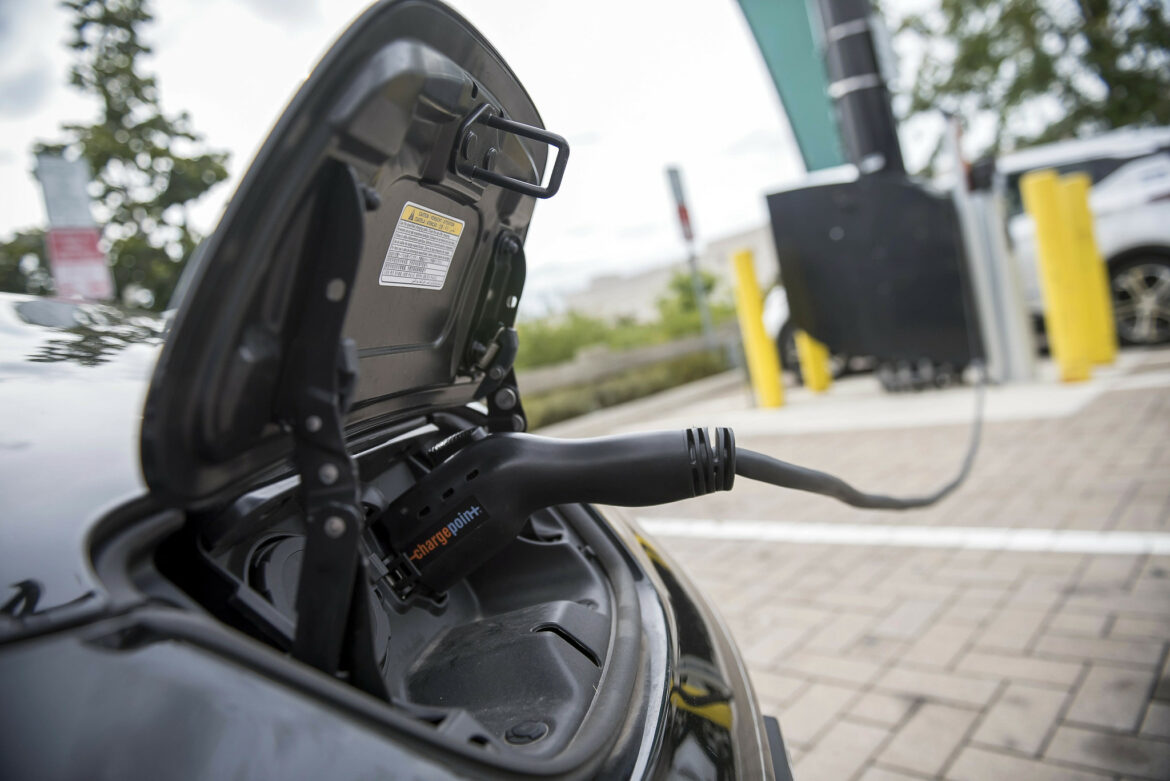“If New York follows California’s lead on this, we risk running into one of the biggest concerns arising from the program—an oversupply of credits from renewable diesel and dairy biogas that negatively disrupts fuel prices and floods methane emissions into the atmosphere.”

Ed Reed/Mayoral Photography Office
An electric vehicle charging at a station in Brooklyn.Many New Yorkers, like Californians, are no strangers to the sight of smog in their skies. We inhale it in the air we breathe and smell it on the streets we walk on—but some suffer from its worst impacts more than others, especially in BIPOC and low-income communities.
In 2009, the California Air Resources Board (CARB) famously tackled the state’s extensive greenhouse gas (GHG) emissions by implementing their marquee program, the Low Carbon Fuel Standard (LCFS). However, what initially promised to decarbonize transportation and cut down on GHGs instead became a handout for venture capitalists, big oil, big agriculture and big gas by pouring the majority of its $4 billion budget into polluting biofuels.
It comes as no surprise then that the price for this shift was paid for by low- and moderate-income Californians. Now, an iteration of California’s LCFS is being proposed in New York as the Clean Fuel Standard (CFS), threatening to derail the just transition and equity provisions ensured by New York’s Climate Act.
Our hard-won Climate Leadership & Community Protection Act (CLCPA) set the directive for New York to transition away from fossil fuels and toward a clean energy future, committing the state to 100 percent zero-emission electricity by 2040, setting legally binding emissions and co-pollutant reduction standards to get New York completely off of fossil fuels by 2050, and ensuring that a minimum of 35 percent of state climate and energy funding be invested in disadvantaged communities.
The misleadingly named Clean Fuel Standard is an industry-supported false solution and is not how we get there. The proposed bill is a market-based mechanism that rewards polluters for using biofuels in the form of credits that they are then able to trade with other players. This cycle not only incentivizes business-as-usual emissions, but also contributes extensively to air pollution.
California’s LCFS has favored biofuels based on a set of analytical and modeling frameworks that fails to consider a low-carbon transportation future without liquid fuels. Roughly 80 percent of the program’s funding went to combustion biofuels rather than electric vehicles—a decidedly better energy alternative—because of inaccurate claims of health and air-quality benefits.
We’ve seen this play out before; it has never worked out well for the frontline communities that are disproportionately impacted by the climate crisis. “Low-carbon” alternatives to fossil fuels are falsely offered as effective solutions, but they worsen our air quality potentially more than conventional combustion fuels. If New York follows California’s lead on this, we risk running into one of the biggest concerns arising from the program—an oversupply of credits from renewable diesel and dairy biogas that negatively disrupts fuel prices and floods methane emissions into the atmosphere.
Where does that leave communities that don’t see improvements to their asthma or other debilitating health conditions caused by pollution? This offers ample reason to redirect funds towards support for non-combustion fuels, something the Clean Fuel Standard does not propose to do.
The CLCPA set a historical mandate that no less than 35 percent of direct investments from clean energy be received by disadvantaged communities. The offset scheme of the Clean Fuel Standard, by directing credits and rewards to polluters, sidelines these impacted communities. Any solution that attempts to tackle air pollution without accounting for its disproportionate impact on vulnerable populations or the voices of environmental justice advocates is not only insufficient but also inherently unjust.
Environmental justice advocates have long proposed effective, equitable alternatives to combustion fuels that are pollution free end to end. Clean energy technologies have advanced insofar as to make biomethane redundant, positioning electric vehicle technology as the alternative that’s better suited for the environment and the people.
We can usher in this electric future by transitioning our transportation sector to zero emission vehicles (ZEVs), a strategy that California has established quite successfully in recent years. We can also build out and shore up our public transportation networks, which serve millions of New Yorkers each year, in New York City and across the state.
We cannot in good conscience let the Clean Fuel Standard be implemented in New York, given what we know about the trajectory of its Californian counterpart. We cannot stand by as our BIPOC and low-income communities continue to be poisoned by toxic emissions; New Yorkers deserve better.
Stephan Edel is the executive director of NY Renews, a statewide climate justice coalition representing over 380 groups and hundreds of thousands of New Yorkers.








